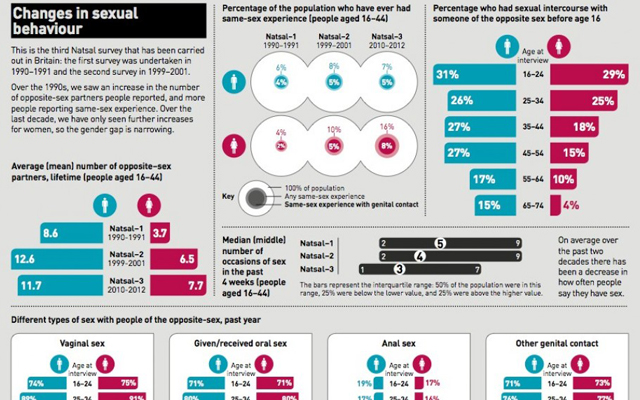A large-scale survey of UK adults aged 16-74 shows some interesting trends and changing attitudes. The headline facts are we’re having less sex than ever before – on average – but women are finding themselves sexually empowered like never before.
The National Survey of Sexual Attitudes and Lifestyles – a 10-yearly ‘census’ – questioned over 15,000 people and showed women are closing the ‘gender gap’ with men, when it comes to the number of sexual partners they’ve cosied up with. In 1991, women aged 16-44 admitted to 3.7 lovers, on average. This has more than doubled to 7.7 in 21 years. Over the same period, men have claimed 8.6 (’91) to 11.7 (’13). Or should that be men have admitted and women have claimed? In 2001 the numbers were 6.5 for women and up to 12.6 for men.
Another area with a significant jump (no pun intended) is the figures for same-sex experiences for women. In 1991, only 1 in 25 (4%) said they’d ‘kissed a girl and liked it’. Now 16% say they’re no stranger to a woman’s touch; more than 1 in 7. Almost 1 in 6, in fact. Again, over the same period men have got a little more open – from 6% to 7% who’ve abandoned themselves to man-love.
On the downside, there’s less sex going on, overall. In ’91 the average was five times per month. It’s now less than once a week. The growth in one-person-households has been suggested as the reason – there are many more singletons now than there were in ’91 and lack of ‘availability’ is probably a factor.
For the silver generation, it’s good news though, as they buck the downward trend of the 16-44 age-group. 40% of women and 60% of men aged 65-75 are sexually active with a partner. ‘Relations’ in addition to an existing relationship are now more frowned on now than they were in ’91. Back then, 44.7% of men and 53.2% disapproved of infidelity. In 2012 that’d risen to 62.5% of men and 69.8% of women. In the same 21 years, attitudes towards same-sex relationships have become more positive.
It’s not all good news though. The survey revealed 1 in 10 women have been forced to have sex against their will, and 1 in 6 pregnancies are unplanned. Some 40% of men and 50% of women report having experienced one or more problems with sexual function, such as a lack of libido, anxiety or functional problems.
The impact of the internet on sexual attitudes over the 1991-2001-2012 period shouldn’t be ignored, with Prof Dame Anne Johnson of University College London, one of the study’s leaders, saying: “I think the whole dynamic of male-female relationships has changed over the past 60 years. It is reflecting how essentially women are now in a position of being able to have sexual lifestyles that are much more similar to men and are accepted by both sides.”
Prof Kaye Wellings of the London School of Hygiene and Tropical Medicine, another of the authors, added: “With three surveys and an age range of 16 to 74 we can take longer view and look at some generational changes over half a century. We see striking changes in the timing of events relating to sexual and reproductive health. We do see a progressive decrease in onset of sexual activity and at the same time we see an increase in time of first cohabitation and becoming a parent. Because those intervals have increased, the length of time during which people are more at risk of adverse sexual health outcomes has increased.”




![20 years of ETO: Harmony, Charing Cross Road, London [reprinted from issue 1, July 2003]](https://www.erotictradeonly.com/wp-content/uploads/2023/08/NEWS_20YEARS_HARMONY_ISSUE1-238x178.jpg)











